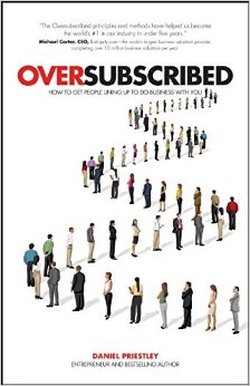 Rating: 5 / 5 Business and enterprise is a journey. It doesn’t matter which books you read, you will inevitably make mistakes; that’s part of the process. If someone presents you with a full roadmap to achieving your dreams you can’t skip fundamental steps and still expect to get where you’re going. Yes, you can take shortcuts by implementing some ideas and concepts in an innovative way so that you drive straight through some stumbling blocks but there are certain fundamental roads you cannot skip. I feel all of Daniel’s concepts are actually easy to implement and don’t leave you asking a million more questions that you can’t answer yourself. Some of the successful people I follow seem to have gotten there by simply being in the right place at the right time without a system they can teach others to follow. Daniel Priestley isn’t one of those. This is why he’s used the same system to grow a few businesses. He’s a very impressive thinker. Having a core team is one of his key suggestions. I’ve been running my own business for over 3 years now and I’ve avoided employing people full-time because I thought it was a major hassle. I saw it as an inconvenience because I couldn’t be bothered to deal with employment legislation. I’ve done a lot by leveraging third-party services such as contract manufacturers, fulfilment houses and freelancers and it’s paid off as the $202,000 made on Amazon USA proves, however, it’s becoming clear that further growth will require a team. I finished listening to Oversubscribed and two weeks after taking stock of where my business has gone I’ve realised that I now own my job! My inbox fills up at an atrociously rapid rate which is great because it means something is working but it also means I have to take my laptop on every holiday. I can work from anywhere in the world, I only work a few hours a day and indeed I hold inventory in the US and in the UK now so I am essentially a one-woman multinational with no full time employees – even I don’t work full-time hours **gasp**. But, what’s the point of carrying your job wherever you go? A business should reach a point where you can go away for two weeks without checking your inbox at all with an expectation that things will still run smoothly in your absence. These are some of my reflections since reading Oversubscribed and I’ll definitely have more on the second listen of the audiobook but I’ve also taken fundamental action. This week I viewed offices for the first time and I am about to start advertising for two roles. One of the roles has been filled before I’ve even committed to the office facilities. A fellow Cambridge grad and friend believes in the work I’m doing so much he’s coming on-board. He’s an engineer with a completely different skill set to mine so it’s a perfect complement. Ultimately, when you read Oversubscribed you will more than likely be inspired by different elements of the book to the ones that inspired me. It all depends on where you are in your business. Employing people is a huge step but when you hire people each person is not just a cost centre but also a revenue centre. A small business with a limited budget has to spend money in the right way so hiring the right people upfront is key. After that you need to track your progress weekly if not daily to ensure you’re on the right path. Having completed Daniel Priestley’s Key Person of Influence program I continue to learn so much from him and the community he’s built. For that, I am grateful.  Want to Build a 6-Figure Beauty Business from the comfort of your sofa? Then my course is designed for YOU! "Beauty" includes a WIDE range of products from the not so obvious non-perishable foods and crafts to the more obvious hair, makeup, fashion, health & fitness. Learn more about The Money Spot Program.
0 Comments
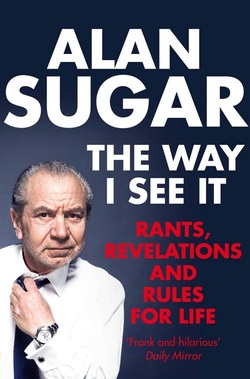 Rating: 5/5 I actually started reading this book in Feb-2014 as Harry and I flew into India. I was due to be interviewed for The Apprentice and thought I needed to do a little research. Whilst I don’t agree with all of Lord Sugar’s opinions I enjoyed his book. He is definitely very switched on and the book was 100% authentic. It stays true to the persona that he portrays. I personally don’t find him to be “mean” on The Apprentice, he is realistic. He doesn’t pussyfoot around and he doesn’t like nonsense. I am very much like that too. Lord Sugar isn’t afraid to offend people. If he doesn’t like you, you will know about it. There’s no pretense with him; very few would dare to describe someone as “That nasally congested hag Janet Street-Porter”. Some Amazon reviews I read prior to this purchase thought he sounded misogynistic, I beg to differ. If you’re a small business the points he raised about maternity leave etc. were very valid. Employees just don’t see things the same way because they have a limited idea of how money is earned. Their concept of credit risk, exposure and the costs of hiring and training is very limited; importantly, even if you understand that stuff in principle you can never fully understand the pain until you are actually running a business. In the book, Lord Sugar goes through many of his thoughts including:
Some of his pearls of wisdom include:
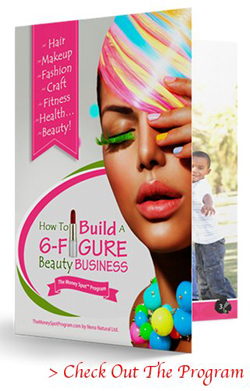 Want to Build a 6-Figure Beauty Business from the comfort of your sofa? Then my course is designed for YOU! "Beauty" includes a WIDE range of products from the not so obvious non-perishable foods and crafts to the more obvious hair, makeup, fashion, health & fitness. Learn more about The Money Spot Program. 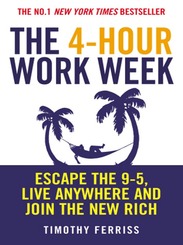 Rating 5*/5 This is not just a 5/5, I also had to give it a star. I've seen this book on the business bestsellers list for weeks and I randomly decided to give it a go. Boy do I not regret it! If you're planning on doing an MBA save your money: get this book and you'll learn most of what you need to start your business on the right foot. What I liked the most about this book is that it affirms a standing belief of mine: don't leave enjoyment until retirement, earn now and enjoy it as you go. The New Rich, want money and time and in this world of technology you can absolutely have your cake and eat it too! The Old Rich had tonnes of dosh and very little to time to enjoy it, not spend it, enjoy it. I already use some of the tools mentioned for automating a business, getting things done faster and delegating but I learnt SOOO much more e.g. I had never heard of fulfilment houses and this knowledge will come in very useful when I go into manufacturing. The book is so good that I have just purchased the paperback after listening to the audiobook; I have to re-read it - I will pore over every page diligently to make sure I've got it all. Normally, I write out the best takeaways but on this occasion I cannot - every other line is gold dust. There was a chapter on email management that I didn't find useful but that came very early on and it was relatively short. There are plenty of tips on how to start a business whilst you're still in employment and how to convince your boss to allow you to work remotely. On time management I have already implemented one suggestion: I am checking my email in batches and I can feel the efficiency benefits already. I was a prolific email checker because my previous job required it but carrying that into my life as an entrepreneur meant I wasn't getting as much done as is possible. Want to increase your email efficiency too? This is what I have done:
As soon as I read the bit on virtual assistants, I got one and I am loving this new time saver. My assistant has helped me to effectively 'double' myself so I can focus on tasks that add more value to the business. She's much more efficient than I am at admin. Some people don't get Tim Ferris, he is slightly arrogant which I personally found funny but it can turn others off. He chooses to spend all his time traveling and seeing the world and some people seem to take it as though he is telling them to do the same, he isn't saying that. His objective is to give you the tools needed to build a very profitable business and release your labour time at the same time so that you can pursue your own non-monetary interests e.g. charity work, spending time with your kids or indeed travel as he has chosen to do. For the first time ever, I commented on a 1* comment on Amazon: If you want to start a business or improve your business but have plenty of free time as well, read this book now!
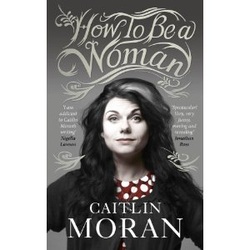 3.75 / 5 A very interesting take on feminism. If you a) have a vagina and b) want to have control over it, then you are a feminist! This is Caitlin Moran's definition and I like it. It's a good definition because many women think being a feminist is radical. Lots of people forget that not so long ago women could not vote, inherit assets or even work. You did not have the choice; it was all decided in advance for you. If you believe that we should have any of this stuff, you are a feminist. Every woman is a feminist and the only question after that is just the degree to which one believes in women's rights and fights for them. Men too can be feminists. I know because I married one! Frankly, I thought that a man had certain very basic expectations of a woman and that to be a good partner I had to fulfill these; being myself was not one of the primary ones. This is why I fervently never expected to get married. I thought that my partner's affections for me would rise with the number of household duties undertaken, the number of times I made his lunches and any other fawning that I could muster. One does not fawn very well. A few interesting bits from Caitlin's take on life, I paraphrase or give my interpretation of what she says:
Overall: insightful and it is great to know her very balanced view on life and being a feminist. Ultimately, the book said to me: BE YOURSELF!
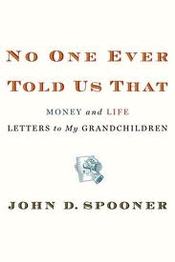 I believe in the wisdom of older people regardless of wealth or educational background. (Most) old people are precious, you can't buy their life experiences, you can only hope to share in some of them. In this book, John D. Spooner shares a series of letters that he has written to his grandchildren to prepare them for "life" Both my grandfathers died before I was even two so I took to thinking of JD Spooner as a sort of surrogate grandfather, or papa as his grandchildren refer to him, as I read this book. I won't go into detail regarding all the examples he gave, however, I would like to share the following lessons I got from the book in the hopes that one or two might touch you. These are not exact quotes, they are just notes I took as I listened to the audiobook.
This book is a bible for the ups and downs of modern day life and it doesn't take long to read! The audio version is only five hours. 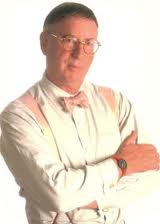 If you don't get any of the above, get the book, it will be one of the best "investments" you make all year. Some of my thoughts: I disagreed with his property investing strategy. He paid all cash when, I think, the genius of property investing in the developed world lies in leverage, using other people's money - but that's another blog on its own. When he covered bonds, JD Spooner didn't cover index-linked bonds, linkers. He simply said that it is equities that keep up with the cost of living, however, Linkers also keep up with inflation. Perhaps this was taking a step too far into high finance. In the section on staying in touch with his past, JD Spooner talked about a friend of his from high school that was a plumber in a town that he moved to. He called the guy to help him out with his plumbing. I wondered, how does he feel when he's in touch with people from his past that haven't achieved nearly as much as he has: he's a multimillionaire investment advisor and author of several bestsellers. In this book, "papa" talks about owning several million dollars of Citigroup stock before it tanked and that would only be one stock in an extensive portfolio, I expect. His friends must revere him, how does he relay to them that he's still the same old guy? This is the only query that remained outstanding by the time I finished the book.
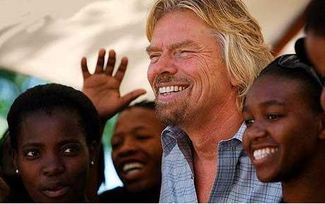 One thing’s for sure. When I eventually meet Richard Branson, he’s going to be completely different to the person I have built him up to be in my mind. Having now read both Business Stripped Bare and Losing My Virginity I can see myself approaching him like an effusive little groupie who feels she knows her Idol as well as she does an old friend but to the Idol the admirer is just another admirer. Anyway, what was Losing My Virginity like? The first half of the book was, to me, much more enjoyable than the second half because it’s very candid and personal. He talks a lot about himself and his lifestyle very openly: the girls, the fun, the drugs, the struggles, the mistakes. He also gives a lot of insight into his upbringing and this gives one a much better idea of why he grew up to be the person he is. Not just success-wise but with regards to his values and views on life. In fact, it reads a little like a novel, which is a good thing. The second half of the book is largely covered in Business Stripped Bare, it is much more business-like and it’s less about his life and more about his ideas and his businesses. Lots of people have this impression that Richard Branson has been rolling in cash for the last thirty plus years. This is not the impression I get from reading this book. Any excess cash in the early days was invested in new ventures such that the Branson Businesses were always operating on a tight rope. Bankers immediately wanted their money back whenever there was so much as the rumor of trouble. Myopic bankers refused to fund Branson beyond rigid limits because they really couldn’t see where his vision was going to take the enterprises. Competing companies (notably British Airways) used every dirty trick in the book to derail any progress. Some highlights from the book: “My parents always treated my two sisters, Lindi and Vanessa, and me as equals whose opinions were just as valid as theirs.” Ditto. It’s a little strange for a Malawian child to say this but I can definitely relate to this. My parents have been treating me like an adult with valid opinions from day zero and I think that has completely influenced the way I manage to interact with people who are much older and have achieved much more than I have. “My parents always encouraged us to have our own opinions and rarely gave us advice unless we asked for it.” I like this. Personally, my parents always gave advice but they always followed that up with the statement, I can give you advice but you don’t have to take it. I frequently chose not to take it because you know what? I thought I knew better! “When I get an idea it has to come out, it is like being sick, a bodily action.” I’ve never heard it put like that before but I like! RB is very fortunate to have been in the position whereby he could actually action his ideas. It takes a lot of guts and nerve of course but this line got me thinking, how many poor villagers in Africa and elsewhere have a burning desire to action a plan but completely no resources to do it? “My parents had always drilled into me that the best motto to follow is ’Nothing ventured, nothing gained’.” That’s a great motto to be brought up on, don’t you think? This might be the reason why the guy always gives it a stab, whatever ‘it’ is at that point in time. Many of us would be so overcome with all the things that could wrong that the idea would remain just that, an idea. I love the passion that Richard Branson has for Africa. However, his focus has so far been on South Africa which is rich compared to many other African countries. I wonder what he would think if he came to a place like Malawi. We look upon our wealthy South African cousins with awe and doubt as to whether we will ever reach a similar state of development. As poor as they might be, we are much much poorer and I think we would benefit from some input from Mr Branson. I don’t blame him for not having come through though, the business environment is not good at all and the Government needs to work hard to change that. If you can’t even buy a tank of fuel to drive around town where does a foreign investor start? Cons? There is a little too much detail in some areas; for instance, the many hot air balloon trips. At first, I thought there was also too much stuff on outer space. Who cares? I thought but when I started getting into it I thought there was some very valid information e.g. the potential to live in outer space if earth was for any reason uninhabitable or even the potential to use resources from outer space as energy sources that will take away our dependence on crude oil. One question remains in my mind: does Richard Branson really relate as well to celebrities as he does to the common man? I got the impression that he does or at least he used to (he’s a lot less exposed to commoners now) and I would really like to know more about this. There are many other things to be gained from reading Losing My Virginity. Get a copy.
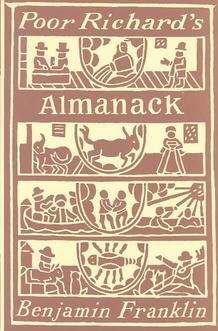 Technology advances in leaps and bounds with every passing year but I believe the fundamental principles of money and wealth haven't really changed one iota in centuries. Ever since I heard Benjamin Franklin's quote: "The way to wealth is as plain as the way to market. It depends chiefly on two words, industry and frugality: that is, waste neither time nor money, but make the best use of both. Without industry and frugality nothing will do, and with them everything." I have endeavoured to live by the principles of industry and frugality. It's not easy, in fact, it's an even greater challenge when you're surrounded by hoards of self-promoting (yet still lovable) Alpha males on a trading floor day in day out. Poor Richard's Almanack is a collection of aphorisms that Benjamin Franklin first published in 1732 and although the book talks about everything from health, love and marriage to business and money, I found his quotes on money and humility most engaging. There were some quotes I didn't get at all and his poetry was even harder to comprehend. That said, I think the bulk of the book, the portion with all the quotes was reasonably easy to read and I would recommend everyone to give it a go. From his writing, Benjamin Franklin saved whatever he could, he spoke only when necessary and he made the best use of his waking hours and I think it's no bad thing to work off the same model. My colleagues think I'm a complete miser and they associate my frugality with misery and being boring, they completely fail to comprehend that one can gain satisfaction from such things as a lone two hours in the park, writing. All their pleasures seem to have crazy nights out drinking absurd amounts of alcohol or spending money at their core - they complain and worry about it but are so deeply rooted in consuming that they do not see it as a problem. One of my colleagues expressed this phenomenon best when he stated his wish for a meter that showed how fast his net worth was falling the moment he hit hit High Street Ken every Saturday morning because it felt as though money just drained out of his pockets from the moment he left his flat! We debate this issue often and in my opinion, I am way happier than they are (yes, not doing too well on the humility stakes today). I am quite content with what I have but that is not to say I don't want more, (almost) everyone wants more, it's what makes us people but to simultaneously be content with your current lot, that is difficult. I have never been a big spender but there was a time when "getting my eagle on" up in the club was what I looked forward to but one day I woke up and I wasn't that girl anymore and Benjamin Franklin's quotes help me to realise that that is actually ok. He was a lot more abstemious than I will ever be but I will try to stick to my belief that no matter how much you have, one should aim not to be wasteful, firstly, because the earth's resources are limited and secondly, because a life of excess erodes the value out of the small pleasures of life. I think the second reason warrants a little explanation: one of my colleagues (the same one as above) told me he feels there is nothing special about a meal out because he eats at Michelin starred restaurants so often. I limit myself to two or three meals out a week, normally to ordinary restaurants and each occasion feels special to me even if it's just to Wagamama's because I love food and if I had it my way I would have a Michelin starred breakfast, lunch and dinner everyday of the week - but unlimited fun limits the pleasure - diminishing marginal utility to my fellow economists. This is the first Benjamin Franklin novel that I have ever read and on the back of it I hope to read more about his life.
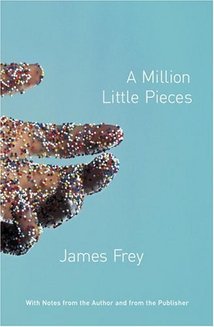 A very good read. The book is about a drug and alcohol addict trying to get over his addiction. I expected to come out thinking it was his own fault and I anticipated a lot of self pity but by the time I was through I had a lot of respect for the guy. I feel better able to relate to the life of an addict and although James Frey refused to accept a genetic predisposition to his addiction, I think it could well be the case for many people. My favourite lines in the book were: - When one lives without fear, one cannot be broken. When one lives with fear one is broken before one begins to live - Confront the difficult while it is easy, accomplish the great one step at a time - Miles on women: "There's no use 'trying' with them. You just 'do'." (Clever man!) - Sometimes skulls are thick. Sometimes hearts are vacant. Somtimes words don't work. The violence was necessary
|
By Heather Katsonga-WoodwardTime allowing, I love to read. If I read anything interesting, I will blog about it here. Categories
All
Archives
November 2015
|

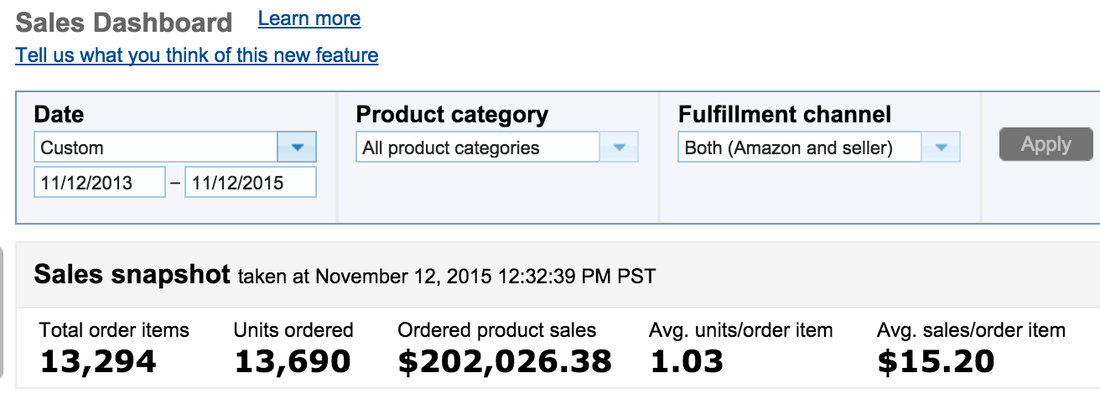
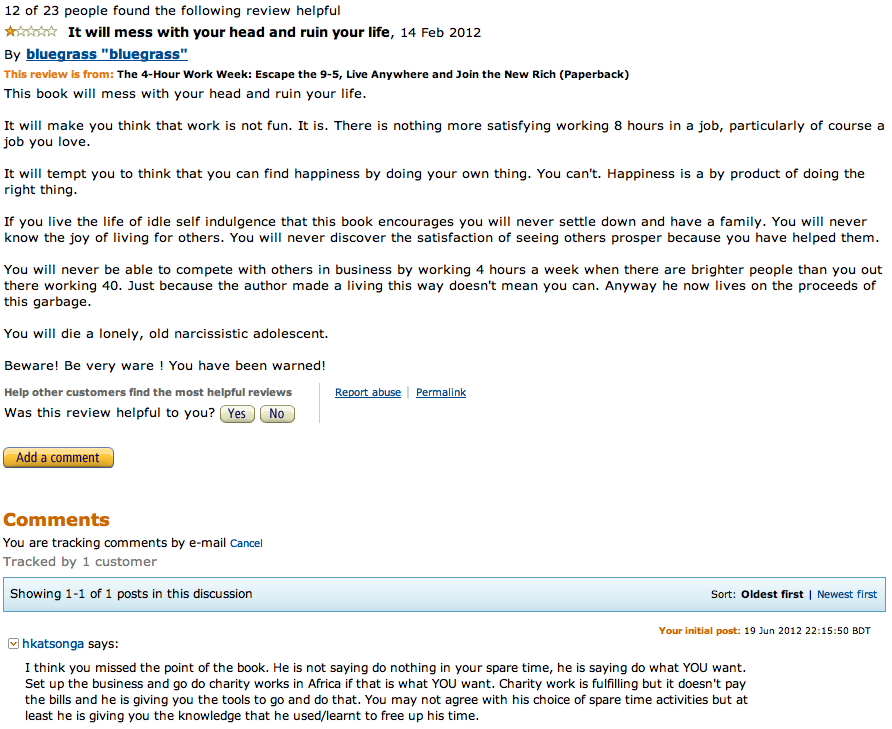
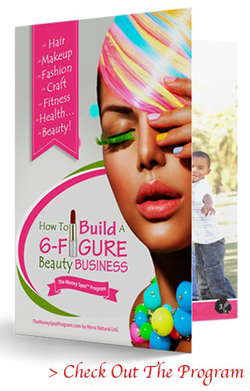
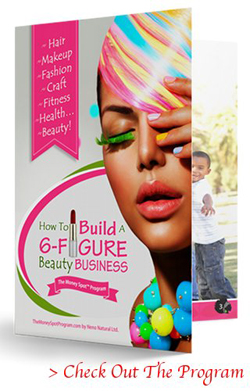
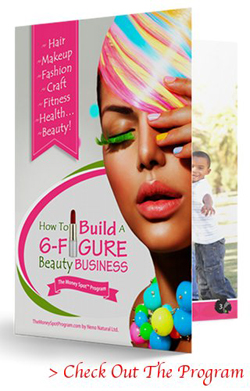
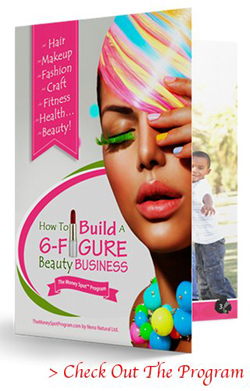
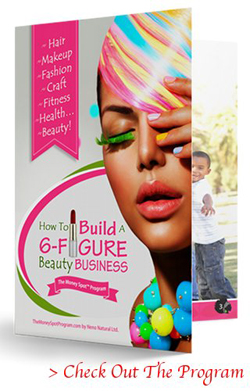

 RSS Feed
RSS Feed






